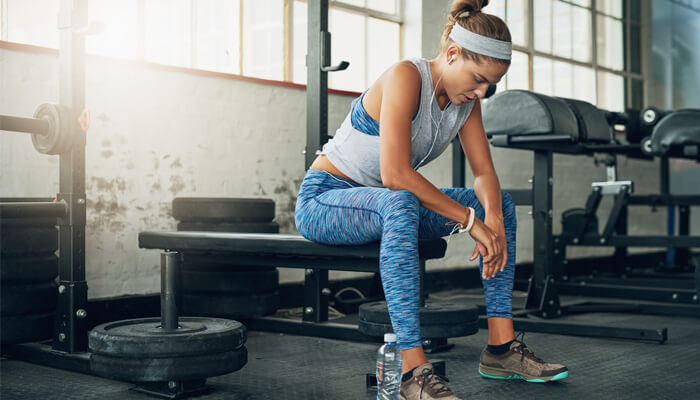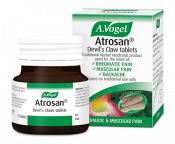Too much exercise
A new exercise class or a burst of any other kind of new and strenuous activity can often cause aches and pains throughout the body. This is known as delayed onset muscle syndrome (DOMS) and is most common when the muscles aren’t used to certain energetic movements. This causes small tears in the muscle fibres and hence the arrival of sudden discomfort. DOMS usually occurs 24-72 hours after exercising but the good news is it clears up quite quickly.
Top tip: for some advice on how to deal with DOMS I’d recommend you read my blog How to relieve sore muscles after a workout - stretching, massaging and a hot bath are all thought to help.

Too little exercise
It would seem there is a healthy balance to be met when it comes to exercising because not doing enough can also cause discomfort. Movement helps to build up muscle mass and improves circulation. This enables oxygenated blood to be sent throughout the body which, in turn, aids muscle function. If you lead a fairly sedentary lifestyle however, then you will not experience these benefits and instead the muscles can become tense and painful.
Top tip: exercise doesn’t have to be anything too strenuous – you can kick-start a more active lifestyle simply by taking a stroll at lunch time or by using the stairs instead of lifts and escalators. For further advice about exercising do take a look at our very own Get Active hub which has a range of tips on how to get started and, even more importantly, on how to keep going!
Repetitive strain injury
Typing, playing a musical instrument and driving are just some of the most common triggers of repetitive strain injury (RSI). These activities involve repeated movements which, when done regularly and allowed to continue for long periods of time, can result in pain. This pain stems from the muscles, tendons and nerves so is most commonly felt in the wrists, neck, shoulders and forearms.1
Top tip: taking regular breaks from the likes of typing and driving is an excellent way to both prevent and ease discomfort. Our Get Active advisor Louise recently wrote a blog entitled easy stretches to do at your desk which provides a great starting point for this.

Arthritis
Inflammation and joint pain can also be caused by arthritis. There are two different types of arthritis: rheumatoid arthritis and osteoarthritis. Osteoarthritis affects the cartilage at the joints so that it roughens and thins. This means that it can become harder to move the joints and they become more painful as well. Rheumatoid arthritis occurs when the immune system targets the joints leading to swelling and pain.
Top tip: it is best to consult your doctor if you suspect you have arthritis or if you need further support to deal with it. The NHS also provides a handy webpage on how to live with the condition which you may also find beneficial.
Magnesium deficiency
A sufficient supply of magnesium affects the function of the nervous system and in doing so it can have a relaxing effect on the muscles. Lack of magnesium dose the opposite however, and can contribute to cramp and muscle spasms. Magnesium deficiency shows up more at night, hence why the cramps may become more prominent then.
Top tip: there are plenty of natural sources of magnesium so our nutritionist Emma recommends you top up on these before turning to any supplements. Pumpkin seeds, mackerel, spinach, brown rice and quinoa are just a few examples of magnesium-rich foods. Our website holds a variety of tasty and delicious recipes incorporating these ingredients including those listed below:
As well as this, not drinking enough water can also worsen muscle cramps so it is important to stay hydrated.

Absence of stress
When we are stressed, be it work-related or otherwise, we don’t always feel pain. That’s because the body’s priority is immediate survival (a response linked to our cave men days when stress really was a case of life or death) and so anything that hinders this is ignored. When the stress subsides however, then soreness may suddenly become evident.
Top tip: Atrosan Devil’s Claw Tablets help to relieve muscle and joint pain. They are made from extracts of cultivated Devil’s Claw rather than being harvested from the wild where the herb is endangered. It can also be used with other medicines and is suitable for those suffering from rheumatism too.
Diet
One of the more surprising triggers of joint pain is diet. Sensitivity to certain foods can trigger inflammation in the body which may then worsen any existing discomfort or cause the onset of pain itself.
Top tip: a study by the University of York involving 177 people found that general aches and pains improved for 88% of participants when they removed their ‘trigger’ food from their diet.2 It may be worth testing this out for yourself if you are sure that diet is the underlying cause of your sore joints and you know which food is most problematic.
That being said, as I’m sure A.Vogel’s digestion advisor Ali would agree, improving your digestion may also have a positive effect. I’d recommend you read her blog 6 easy ways to improve your digestion for further advice on this – chewing lots, avoiding dairy and staying hydrated are Ali’s top tips!
Don’t forget!
If you are unsure about the underlying of cause of your discomfort or it doesn’t improve with the actions you take at home, it is always advisable to seek professional advice from your doctor.
References
1 https://www.nhs.uk/conditions/repetitive-strain-injury-rsi/
2 https://www.yorktest.com/uploads/pdfs/5000_survey_hardman_and_hart.pdf









